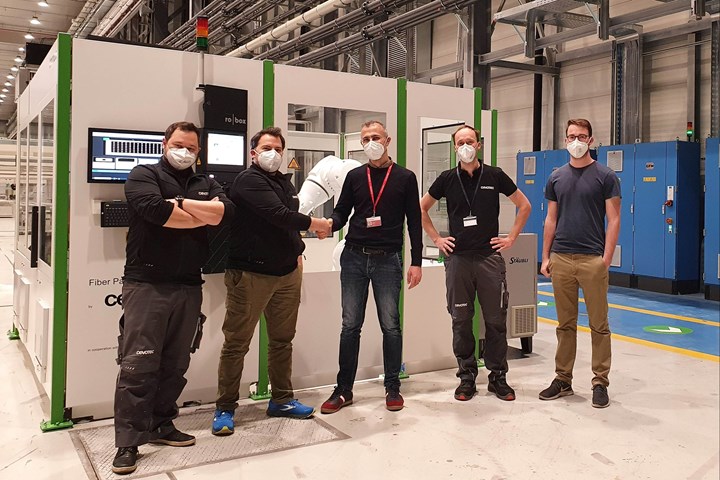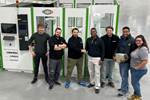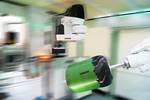Cevotec commissions advanced SAMBA Pro Prepreg system with six-axis robots to Leonardo
A system first with two six-axis robots for tool manipulation and patch placement, increasing the capabilities to process larger, more complex part geometries for composite aerostructure applications.

Cevotec’s SAMBA Pro Prepreg System at Leonardo in Italy. (left to right): Kamil Nalewajka (Cevotec), Dr. Dimitrios Sikoutris (Cevotec), Angelo Sportelli (Leonardo), Richard Carle (Cevotec), Lorenz Weiß (Baumann). Photo Credit: Cevotec
Cevotec GmbH (Munich, Germany) has successfully commissioned a SAMBA Pro Prepreg system, based on its fiber patch placement (FPP) technology to Leonardo (Rome, Italy). With the adoption of FPP to its portfolio of automation technologies for complex composite in R&D development, Cevotec says the global aerospace, defense and security player has strengthened its role in the field of composite aerostructures.
Cevotec’s SAMBA systems are particularly suited to automate the layup of multi-material composites and complex-shaped parts. The range of components matches well with the requirements of urban air mobility applications (UAM) as well as complex sandwich structures for commercial aircraft, the company adds.
“We are proud to work with an aerospace and defense giant as Leonardo on advancing FPP technology for composite aerostructures,” Thorsten Groene, CEO and co-founder of Cevotec, says. “I’m impressed by Leonardo’s technological vision for future composite production, and we look forward to supporting them with FPP.”
The SAMBA Pro Prepreg system was commissioned at the beginning of March 2022 after one year of designing, developing and installing the system at one of Leonardo’s production facilities in Italy. It is said to be the first FPP system featuring two six-axis robots for tool manipulation and patch placement. According to Cevotec, using a six-axis pick-and-place robot for the patch placement operation significantly increases the capabilities to process larger and even more complex part geometries. The gripper attached to the placement robot, available in sizes from 45 millimeters x 90 millimeters, up to 60 millimeters x 240 millimeters, can place patches across 90° edges as well as on biaxially curved surfaces without negative draping effects. Moreover, the six-axis robot further enables system extensions with additional placement features such as the rolling motion placement. This capability increases the degrees of freedom for placing patches on challenging surface geometries, including honeycomb cores.
Equipped with an advanced process monitoring, Cevotec says the system ensures that only 100% in-spec raw material is processed. The two in-process vision inspections systems for quality control check the geometrical accuracy of each patch as well as the position on the placement gripper. The SAMBA system, with advanced material cooling, is also able to process a various range of fiber material such as carbon and glass fibers — in dry fiber and prepreg configurations — and other technical materials like adhesives. The ultrasonic cutting unit features a cutting head from GFM Austria (Steyr) and is said to improves cutting performance, especially for prepreg material, enabling patches with an areal weight of up to 300 gsm to be precisely cut from the fiber tape.
“The system commissioned at Leonardo is the most advanced SAMBA Pro system to date,” Dr. Dimitrios Sikoutris from Cevotec claims. “FPP has a big potential for aerospace manufacturing, and we are happy to advance this technology and develop new applications together with such an experienced partner.”
Related Content
-
ASCEND program update: Designing next-gen, high-rate auto and aerospace composites
GKN Aerospace, McLaren Automotive and U.K.-based partners share goals and progress aiming at high-rate, Industry 4.0-enabled, sustainable materials and processes.
-
PEEK vs. PEKK vs. PAEK and continuous compression molding
Suppliers of thermoplastics and carbon fiber chime in regarding PEEK vs. PEKK, and now PAEK, as well as in-situ consolidation — the supply chain for thermoplastic tape composites continues to evolve.
-
Combining multifunctional thermoplastic composites, additive manufacturing for next-gen airframe structures
The DOMMINIO project combines AFP with 3D printed gyroid cores, embedded SHM sensors and smart materials for induction-driven disassembly of parts at end of life.















